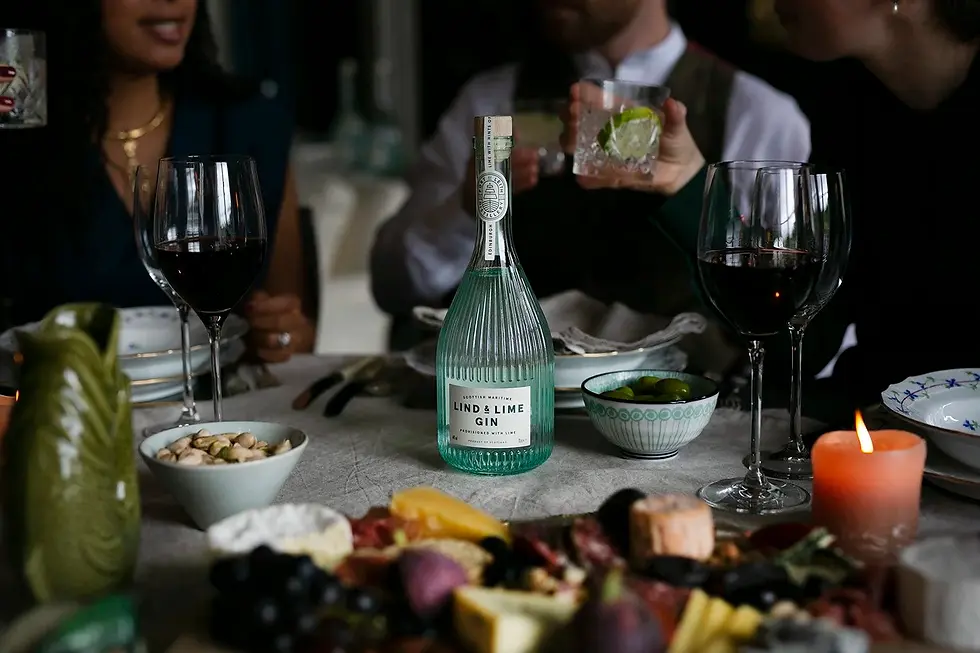From German Farmland to Michelin Stars
- Sales Team
- Jul 6, 2025
- 7 min read
Updated: Jul 7, 2025
The Culinary Journey of Chef Jan Gundlach
In the world of haute cuisine, few stories are as compelling as that of Jan Gundlach—a chef whose path from a German farming village of 160 souls to Michelin-starred kitchens across three continents reads like a masterclass in culinary evolution. His journey embodies the transformation of simple, honest cooking into sophisticated gastronomy, while never losing sight of the foundational principles that shaped his palate in childhood.

Forged by the Land
Gundlach's story begins in the pastoral countryside of northern Germany, where his formative years were spent not in traditional classrooms, but in the fields and forests that would become his first culinary teachers. Born into a world where seasonal rhythms dictated daily life, he describes a childhood deeply connected to the natural world—a shy, quiet boy who found solace playing along creeks and rivers, where football games provided youthful escape from what he diplomatically calls the "tyranny" of formal education.
The real education came through labour. From age 13, Gundlach worked on his uncles' mixed farm, engaging in what he describes as "really hard yakka"—Australian slang that reflects his later adopted homeland. The work was gruelling: forking cow manure, feeding livestock, cutting sugar beets, and loading hay bales. The reward? Occasional turns at the wheel of the farm tractor. He vividly recalls spending eight hours alone on a 1960 KH Deutz tractor at age 14, cultivating six hectares of heavy soil—a task that left him exhausted and temporarily deaf from the engine's roar.
This early exposure to strenuous physical labour instilled more than a work ethic; it provided a philosophical foundation. His uncles, whom he describes as "true polymaths" capable of welding, bricklaying, carpentry, and construction, taught him that dedication and heart could overcome any challenge. These lessons would prove invaluable when the pressures of professional kitchens tested his resolve.
Shaped by Loss and Love
Despite the idyllic rural setting, profound tragedy struck when Gundlach was eleven. His father, an architect and civil engineer who had built his career from a three-year bricklaying apprenticeship, died in a car accident. The loss was devastating, but his father's example—of building respect through practical knowledge and maintaining positivity despite limited time—would echo throughout Gundlach's career.
His fondest memories of his father centre not on specific events but on simply being together, "because time was always so limited." This awareness of time's precious nature would later influence his approach to hospitality and the ceremonial aspects of fine dining.

The Alchemy of Farmhouse Kitchens
Gundlach's earliest culinary education took place in the kitchens of his aunt and his best friend's mother—both farmers who performed daily miracles of efficiency and flavour. These women prepared three-course lunches by noon and baked cakes for afternoon tea, all while managing demanding farm work from dawn to dusk.
The secret to their extraordinary cooking lay in radical simplicity and peak freshness. Produce travelled mere steps from field to table, transformed by cooks who understood that time constraints demanded focus on the natural flavors of ingredients rather than elaborate preparations. This philosophy of allowing produce to shine through minimal intervention would become central to Gundlach's culinary identity.
The catalogue of dishes from this period reads like a lost pastoral symphony: roasted pork with seasonal vegetables, white asparagus served with German-cured ham and parsley potatoes, twenty varieties of foraged mushrooms pan-fried with scrambled eggs, and trout pulled fresh from the stream. Desserts included homemade cakes, puddings, and Rote Grütze—a berry and sago jelly served with cream so fresh it came from cows milked that morning.
One dish holds particular reverence in his memory: Hollunderkaltschale, a chilled summer soup with elderberries, some deep-fried in tempura-like batter, creating what he describes as "a delightful interplay of textural with sweet and sour aspects harmonising, acidity and dairy richness."
The Mentor Who Changed Everything
At sixteen, Gundlach encountered the figure who would become his most significant culinary influence: Gerhard Dammert, often called "the Bocuse of Germany." Dammert became what Gundlach colourfully describes as his "inspirational stick and carrot instigator"—fortunately, now minus the stick. Even in retirement, Dammert continues to mentor his former protégé, regularly sending selected German newspaper clippings and maintaining their tradition of fortnightly phone conversations.


The Crucible of Professional Training
Gundlach's formal culinary education began at fifteen through Germany's dual apprenticeship system, splitting time between practical kitchen work and theoretical study at hotel school. His workplace was the Park Restaurant Alte Mühle, housed in a historic mill dating to 1580 and a farmhouse from 1721. The cuisine blended regional German traditions with classical French techniques.
His initiation was characteristically humble: chopping three kilograms of parsley daily and cutting thirty kilograms of red cabbage three times weekly, followed by relentless cleaning of fridges, ovens, and equipment. This foundational work lasted three months, embodying the profession's fundamental principle that everyone must "do their time."
The head chef operated under a philosophy that bordered on brutal: "If an apprentice does not cry at least once a day, I haven't done my job well enough." Yet this demanding environment was also nurturing, constantly pushing apprentices to develop skills while providing opportunities to practice and learn.
Gundlach's first wage was a modest 180 Deutsche Marks monthly (equivalent to 90 euros today), but his dedication was rewarded when his boss increased his pay to a Commis de Cuisine wage of 1,200 marks four months before graduation, recognising that he was "running my own section and supervising other apprentices."
Trials by Fire
Professional kitchens are unforgiving environments where mistakes can have catastrophic consequences. Gundlach's worst day as an apprentice came when he accidentally set fire to a six-square-meter diesel-fired cooking surface while clarifying twenty kilograms of butter. The butter foamed over and ignited while the entire team was in the dining room managing a buffet for 200 guests.
His quick thinking—using buckets of salt and a lid to extinguish the flames—averted disaster. The head chef's response was characteristically blunt but appreciative: "Very good response, Jan. Now clean up the f—— mess." The incident reinforced the kitchen's unspoken rule: "What happens in the kitchen stays in the kitchen."
Olympic Gold and Global Recognition
Gundlach's talents extended beyond daily service to competitive cooking. His visit to the Culinary Olympics in Frankfurt in 1977 inspired a competitive career that would see him earn gold medals with distinction in 1986, along with further golds at events like the Salon Culinaire in Singapore and Basel. He served six years on the German Culinary National Team, achievements that reflect his technical mastery and creative vision.
His motivation throughout this period stemmed from what he describes as "an everlasting love for cooking" and "an eternal search for culinary truth." The rewards weren't monetary but personal: compliments on dishes, recognition for jobs well done, and the endless fascination with perfecting culinary skills.

The Michelin Star Years
Gundlach's first Head Chef position at Restaurant Bakkarat in Hannover marked a significant evolution in his career. The restaurant earned one Michelin star in 1987, representing a dramatic shift from his apprenticeship environment. Where Alte Mühle focused on classical drilling and productivity, Bakkarat embodied nouvelle cuisine with its emphasis on gentler cooking processes, shorter cooking times, and an elevated focus on product quality.
The Australian Chapter
Gundlach's journey to Australia began with a geography essay that earned him a rare "A" grade and sparked a lifelong fascination with the continent. He first visited Perth in 1987 for a holiday and secured permanent residency six months later, during an era when chefs were "on the most wanted list"—a situation he wryly notes should exist today.
His Australian venture, Senso Restaurant in Canberra, achieved 17.5 points in the Sydney Good Food Guide in 2010. The restaurant offered only degustation menus, with daily changing offerings dictated by morning shopping excursions to select the finest produce from Canberra's premier fresh food market. His guiding philosophy, adopted from legendary French chef Fernand Point, was simple yet profound: "Every morning one must start from scratch, with nothing on the stoves. That is cuisine!"
Global Impact and Legacy
As Executive Chef for prestigious hotel groups including Hong Kong & Shanghai Hotels (Peninsula Group) and Raffles Hotel Singapore, Gundlach conceptualised approximately ten restaurants. His multi-ethnic concept Doc Cheng's became a trendsetter, copied worldwide, while Plantation restaurant at Raffles achieved significant success through his innovative approach to regional cuisine.
Despite reaching such heights, Gundlach remained focused on continuous improvement, describing himself as his "own harshest critique." The greatest rewards, he explains, come not from individual dishes but from developing others: "A dish is a dish, but the one fulfilling thing in life is to have passed on knowledge or skill, when you make those that are under your professional care better chefs and better people than you are yourself."
The Philosophy of Informed Subjectivity
Today, Gundlach describes his cuisine as "the summary of everything learned by studying and practicing; experienced by tasting and dining and by discussion with leading chefs, gourmands, restaurant critics, producers, farmers and winemakers." This represents what he calls "informed subjectivity"—cooking influenced by discernment, professional integrity, respect for produce, and genuine hospitality.
His approach to German cuisine emphasises diversity dictated by four contrasting seasons, something he misses about his homeland. He particularly recalls the white asparagus and game seasons, the arrival of first matjes (special salted herring) in May, and autumn's Schlachtfest (slaughter feast) with special sausages and cuts of pork accompanied by braised kale or sauerkraut, aided by copious amounts of schnapps and Jägermeister.

Wisdom for the Next Generation
For aspiring chefs, Gundlach's advice is characteristically direct: "Read, learn and study. Absorb culinary doctrine, indulge in ethnic cuisines and attain in-depth product knowledge. Only knowledge makes you command good pay. Practice skills to perfection. Train relentlessly to become a very good taster, because you can't be a great chef unless you're a discerning taster."
His journey from a German farming village to international culinary recognition represents more than personal achievement—it embodies the evolution of modern gastronomy itself. In an era of molecular gastronomy and Instagram-worthy presentations, Gundlach's story reminds us that the foundation of great cooking remains unchanged: respect for ingredients, mastery of technique, and the understanding that food is ultimately about bringing people together in celebration of life's essential pleasures.
Through fifty-five years in commercial kitchens, Chef Jan Gundlach has proven that the path from farmland to Michelin stars is built not on shortcuts or gimmicks, but on the timeless values of hard work, continuous learning, and an unwavering commitment to excellence. His legacy lies not just in the dishes he has created, but in the generations of chefs he has inspired to seek their own culinary truth.

_edited_edited.png)



Comments